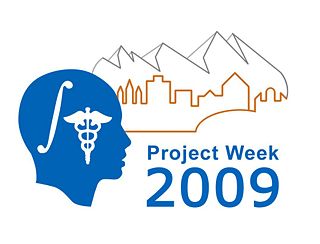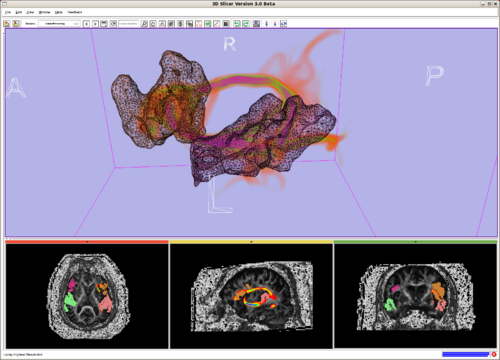Difference between revisions of "2008 Winter Project Week:StochasticTract Arcuate"
(New page: {| |thumb|320px|Return to [[2008_Winter_Project_Week ]] |valign="top"| |} __NOTOC__ ===Key Investigators=== * BWH: Marek Kubicki, Tri Ngo, Doug Markant <div style...) |
|||
| (12 intermediate revisions by 2 users not shown) | |||
| Line 1: | Line 1: | ||
{| | {| | ||
|[[Image:NAMIC-SLC.jpg|thumb|320px|Return to [[2008_Winter_Project_Week]] ]] | |[[Image:NAMIC-SLC.jpg|thumb|320px|Return to [[2008_Winter_Project_Week]] ]] | ||
| − | |valign="top"| | + | |valign="top"|[[Image:Arcuatetractvolume2.png|thumb|500px|Volume rendering of the connectivity map generated using the Stochastic Tractography Filter. Seed region was the inferior frontal gyrus and end region was the temporal lobe (ROIs are shown as wireframes)]] |
|} | |} | ||
| Line 13: | Line 13: | ||
<h1>Objective</h1> | <h1>Objective</h1> | ||
| − | The objective of this project is to use the Stochastic Tractography Filter in Slicer3 in a group comparison of the arcuate fasciculus. | + | The objective of this project is to use the Stochastic Tractography Filter in Slicer3 in a group comparison of the arcuate fasciculus between healthy controls and chronic schizophrenics. |
</div> | </div> | ||
| Line 20: | Line 20: | ||
<h1>Approach, Plan </h1> | <h1>Approach, Plan </h1> | ||
| − | The Stochastic Tractography Filter has been integrated into Slicer3. Our approach is to use ROIs automatically generated from the Freesurfer reconstruction to generate connectivity maps of the arcuate fasciculus in matched groups of healthy controls and chronic schizophrenic patients. We will investigate how best to measure the diffusion properties of the tracts generated by this filter and to facilitate a group comparison. | + | The Stochastic Tractography Filter has been integrated into Slicer3. Our approach is to use ROIs automatically generated from the Freesurfer reconstruction to generate connectivity maps of the arcuate fasciculus in matched groups of healthy controls and chronic schizophrenic patients. We will investigate how best to measure the diffusion properties of the tracts generated by this filter and how to facilitate a group comparison. |
| + | |||
| + | It is unclear whether a volumetric or tract-based approach is more appropriate for this kind of statistical analysis. Thus we will be comparing results from both, using statistical metrics such as volume, FA, trace, relative connectivity, etc. | ||
</div> | </div> | ||
| Line 27: | Line 29: | ||
<h1>Progress</h1> | <h1>Progress</h1> | ||
| + | We found a statistically significant increase in right mean trace in the Schizophrenia Group. | ||
| + | |||
| + | [[Media:NAMIC_AHM_Arcuate.ppt|Progress Report Presentation]] | ||
</div> | </div> | ||
Latest revision as of 15:46, 11 February 2008
Home < 2008 Winter Project Week:StochasticTract Arcuate Return to 2008_Winter_Project_Week |
Key Investigators
- BWH: Marek Kubicki, Tri Ngo, Doug Markant
Objective
The objective of this project is to use the Stochastic Tractography Filter in Slicer3 in a group comparison of the arcuate fasciculus between healthy controls and chronic schizophrenics.
Approach, Plan
The Stochastic Tractography Filter has been integrated into Slicer3. Our approach is to use ROIs automatically generated from the Freesurfer reconstruction to generate connectivity maps of the arcuate fasciculus in matched groups of healthy controls and chronic schizophrenic patients. We will investigate how best to measure the diffusion properties of the tracts generated by this filter and how to facilitate a group comparison.
It is unclear whether a volumetric or tract-based approach is more appropriate for this kind of statistical analysis. Thus we will be comparing results from both, using statistical metrics such as volume, FA, trace, relative connectivity, etc.
Progress
We found a statistically significant increase in right mean trace in the Schizophrenia Group.
